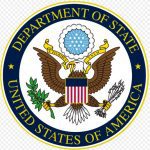The United States has imposed further visa restrictions on Georgian officials for “undermining democracy” amid ongoing popular protests against the ruling Georgian Dream party’s decision to postpone the Caucasus country’s EU membership negotiations.
Protesters have also called for fresh elections following allegations of electoral fraud during the October parliamentary poll whose results the opposition has refused to recognize, claiming Georgian Dream rigged the vote to cling to power.
Salome Zurabishvili, a pro-European president who has supported the demonstrators, has claimed that Russia helped rig the polls.
Hundreds of people have been arrested in the last two weeks as a result of the harsh response by authorities to the most recent protest wave.
On Thursday, the U.S. State Department responded by declaring that it will “prohibit visa issuance to those who are responsible for, or complicit in, undermining democracy in Georgia.”
Since the start of the protests at the end of November, violence against the opposition and journalists has escalated, drawing condemnation from the United States and the European Union.

Georgian police agents raided the offices of rights campaigners, demonstration organizers, and a number of opposition groups on December 4.
The United States stated again that it “strongly condemns the Georgian Dream party’s ongoing, brutal, and unjustified violence against Georgian citizens, including protesters, members of the media, human rights activists, and opposition figures.”
Georgia’s ruling party responded to the announcement by saying the visa restrictions would be “nothing but a gross attempt to restrict Georgia’s independence and sovereignty.”
The reaction from Georgian Dream also accused the United States of pursuing a policy of “threats and blackmail” and “anti-Georgian rhetoric,” adding that “no blackmail whatsoever can force us to go against our country.”
Critics accuse Georgian Dream, established by Russia-friendly billionaire and former prime minister, Bidzina Ivanishvili, of becoming increasingly totalitarian.
Earlier this year, Georgian Dream pushed through a foreign-agent law, which was fashioned after a similar Russian piece of legislation used by the Kremlin to suppress political opposition and criticism.
The United States has imposed further visa restrictions on Georgian officials for “undermining democracy” amid ongoing popular protests against the ruling Georgian Dream party’s decision to postpone the Caucasus country’s EU membership negotiations.
Protesters have also called for fresh elections following allegations of electoral fraud during the October parliamentary poll whose results the opposition has refused to recognize, claiming Georgian Dream rigged the vote to cling to power.
Salome Zurabishvili, a pro-European president who has supported the demonstrators, has claimed that Russia helped rig the polls.
Hundreds of people have been arrested in the last two weeks as a result of the harsh response by authorities to the most recent protest wave.
On Thursday, the U.S. State Department responded by declaring that it will “prohibit visa issuance to those who are responsible for, or complicit in, undermining democracy in Georgia.”
Since the start of the protests at the end of November, violence against the opposition and journalists has escalated, drawing condemnation from the United States and the European Union.

Georgian police agents raided the offices of rights campaigners, demonstration organizers, and a number of opposition groups on December 4.
The United States stated again that it “strongly condemns the Georgian Dream party’s ongoing, brutal, and unjustified violence against Georgian citizens, including protesters, members of the media, human rights activists, and opposition figures.”
Georgia’s ruling party responded to the announcement by saying the visa restrictions would be “nothing but a gross attempt to restrict Georgia’s independence and sovereignty.”
The reaction from Georgian Dream also accused the United States of pursuing a policy of “threats and blackmail” and “anti-Georgian rhetoric,” adding that “no blackmail whatsoever can force us to go against our country.”
Critics accuse Georgian Dream, established by Russia-friendly billionaire and former prime minister, Bidzina Ivanishvili, of becoming increasingly totalitarian.
Earlier this year, Georgian Dream pushed through a foreign-agent law, which was fashioned after a similar Russian piece of legislation used by the Kremlin to suppress political opposition and criticism.
The United States has imposed further visa restrictions on Georgian officials for “undermining democracy” amid ongoing popular protests against the ruling Georgian Dream party’s decision to postpone the Caucasus country’s EU membership negotiations.
Protesters have also called for fresh elections following allegations of electoral fraud during the October parliamentary poll whose results the opposition has refused to recognize, claiming Georgian Dream rigged the vote to cling to power.
Salome Zurabishvili, a pro-European president who has supported the demonstrators, has claimed that Russia helped rig the polls.
Hundreds of people have been arrested in the last two weeks as a result of the harsh response by authorities to the most recent protest wave.
On Thursday, the U.S. State Department responded by declaring that it will “prohibit visa issuance to those who are responsible for, or complicit in, undermining democracy in Georgia.”
Since the start of the protests at the end of November, violence against the opposition and journalists has escalated, drawing condemnation from the United States and the European Union.

Georgian police agents raided the offices of rights campaigners, demonstration organizers, and a number of opposition groups on December 4.
The United States stated again that it “strongly condemns the Georgian Dream party’s ongoing, brutal, and unjustified violence against Georgian citizens, including protesters, members of the media, human rights activists, and opposition figures.”
Georgia’s ruling party responded to the announcement by saying the visa restrictions would be “nothing but a gross attempt to restrict Georgia’s independence and sovereignty.”
The reaction from Georgian Dream also accused the United States of pursuing a policy of “threats and blackmail” and “anti-Georgian rhetoric,” adding that “no blackmail whatsoever can force us to go against our country.”
Critics accuse Georgian Dream, established by Russia-friendly billionaire and former prime minister, Bidzina Ivanishvili, of becoming increasingly totalitarian.
Earlier this year, Georgian Dream pushed through a foreign-agent law, which was fashioned after a similar Russian piece of legislation used by the Kremlin to suppress political opposition and criticism.
The United States has imposed further visa restrictions on Georgian officials for “undermining democracy” amid ongoing popular protests against the ruling Georgian Dream party’s decision to postpone the Caucasus country’s EU membership negotiations.
Protesters have also called for fresh elections following allegations of electoral fraud during the October parliamentary poll whose results the opposition has refused to recognize, claiming Georgian Dream rigged the vote to cling to power.
Salome Zurabishvili, a pro-European president who has supported the demonstrators, has claimed that Russia helped rig the polls.
Hundreds of people have been arrested in the last two weeks as a result of the harsh response by authorities to the most recent protest wave.
On Thursday, the U.S. State Department responded by declaring that it will “prohibit visa issuance to those who are responsible for, or complicit in, undermining democracy in Georgia.”
Since the start of the protests at the end of November, violence against the opposition and journalists has escalated, drawing condemnation from the United States and the European Union.

Georgian police agents raided the offices of rights campaigners, demonstration organizers, and a number of opposition groups on December 4.
The United States stated again that it “strongly condemns the Georgian Dream party’s ongoing, brutal, and unjustified violence against Georgian citizens, including protesters, members of the media, human rights activists, and opposition figures.”
Georgia’s ruling party responded to the announcement by saying the visa restrictions would be “nothing but a gross attempt to restrict Georgia’s independence and sovereignty.”
The reaction from Georgian Dream also accused the United States of pursuing a policy of “threats and blackmail” and “anti-Georgian rhetoric,” adding that “no blackmail whatsoever can force us to go against our country.”
Critics accuse Georgian Dream, established by Russia-friendly billionaire and former prime minister, Bidzina Ivanishvili, of becoming increasingly totalitarian.
Earlier this year, Georgian Dream pushed through a foreign-agent law, which was fashioned after a similar Russian piece of legislation used by the Kremlin to suppress political opposition and criticism.
The United States has imposed further visa restrictions on Georgian officials for “undermining democracy” amid ongoing popular protests against the ruling Georgian Dream party’s decision to postpone the Caucasus country’s EU membership negotiations.
Protesters have also called for fresh elections following allegations of electoral fraud during the October parliamentary poll whose results the opposition has refused to recognize, claiming Georgian Dream rigged the vote to cling to power.
Salome Zurabishvili, a pro-European president who has supported the demonstrators, has claimed that Russia helped rig the polls.
Hundreds of people have been arrested in the last two weeks as a result of the harsh response by authorities to the most recent protest wave.
On Thursday, the U.S. State Department responded by declaring that it will “prohibit visa issuance to those who are responsible for, or complicit in, undermining democracy in Georgia.”
Since the start of the protests at the end of November, violence against the opposition and journalists has escalated, drawing condemnation from the United States and the European Union.

Georgian police agents raided the offices of rights campaigners, demonstration organizers, and a number of opposition groups on December 4.
The United States stated again that it “strongly condemns the Georgian Dream party’s ongoing, brutal, and unjustified violence against Georgian citizens, including protesters, members of the media, human rights activists, and opposition figures.”
Georgia’s ruling party responded to the announcement by saying the visa restrictions would be “nothing but a gross attempt to restrict Georgia’s independence and sovereignty.”
The reaction from Georgian Dream also accused the United States of pursuing a policy of “threats and blackmail” and “anti-Georgian rhetoric,” adding that “no blackmail whatsoever can force us to go against our country.”
Critics accuse Georgian Dream, established by Russia-friendly billionaire and former prime minister, Bidzina Ivanishvili, of becoming increasingly totalitarian.
Earlier this year, Georgian Dream pushed through a foreign-agent law, which was fashioned after a similar Russian piece of legislation used by the Kremlin to suppress political opposition and criticism.
The United States has imposed further visa restrictions on Georgian officials for “undermining democracy” amid ongoing popular protests against the ruling Georgian Dream party’s decision to postpone the Caucasus country’s EU membership negotiations.
Protesters have also called for fresh elections following allegations of electoral fraud during the October parliamentary poll whose results the opposition has refused to recognize, claiming Georgian Dream rigged the vote to cling to power.
Salome Zurabishvili, a pro-European president who has supported the demonstrators, has claimed that Russia helped rig the polls.
Hundreds of people have been arrested in the last two weeks as a result of the harsh response by authorities to the most recent protest wave.
On Thursday, the U.S. State Department responded by declaring that it will “prohibit visa issuance to those who are responsible for, or complicit in, undermining democracy in Georgia.”
Since the start of the protests at the end of November, violence against the opposition and journalists has escalated, drawing condemnation from the United States and the European Union.

Georgian police agents raided the offices of rights campaigners, demonstration organizers, and a number of opposition groups on December 4.
The United States stated again that it “strongly condemns the Georgian Dream party’s ongoing, brutal, and unjustified violence against Georgian citizens, including protesters, members of the media, human rights activists, and opposition figures.”
Georgia’s ruling party responded to the announcement by saying the visa restrictions would be “nothing but a gross attempt to restrict Georgia’s independence and sovereignty.”
The reaction from Georgian Dream also accused the United States of pursuing a policy of “threats and blackmail” and “anti-Georgian rhetoric,” adding that “no blackmail whatsoever can force us to go against our country.”
Critics accuse Georgian Dream, established by Russia-friendly billionaire and former prime minister, Bidzina Ivanishvili, of becoming increasingly totalitarian.
Earlier this year, Georgian Dream pushed through a foreign-agent law, which was fashioned after a similar Russian piece of legislation used by the Kremlin to suppress political opposition and criticism.
The United States has imposed further visa restrictions on Georgian officials for “undermining democracy” amid ongoing popular protests against the ruling Georgian Dream party’s decision to postpone the Caucasus country’s EU membership negotiations.
Protesters have also called for fresh elections following allegations of electoral fraud during the October parliamentary poll whose results the opposition has refused to recognize, claiming Georgian Dream rigged the vote to cling to power.
Salome Zurabishvili, a pro-European president who has supported the demonstrators, has claimed that Russia helped rig the polls.
Hundreds of people have been arrested in the last two weeks as a result of the harsh response by authorities to the most recent protest wave.
On Thursday, the U.S. State Department responded by declaring that it will “prohibit visa issuance to those who are responsible for, or complicit in, undermining democracy in Georgia.”
Since the start of the protests at the end of November, violence against the opposition and journalists has escalated, drawing condemnation from the United States and the European Union.

Georgian police agents raided the offices of rights campaigners, demonstration organizers, and a number of opposition groups on December 4.
The United States stated again that it “strongly condemns the Georgian Dream party’s ongoing, brutal, and unjustified violence against Georgian citizens, including protesters, members of the media, human rights activists, and opposition figures.”
Georgia’s ruling party responded to the announcement by saying the visa restrictions would be “nothing but a gross attempt to restrict Georgia’s independence and sovereignty.”
The reaction from Georgian Dream also accused the United States of pursuing a policy of “threats and blackmail” and “anti-Georgian rhetoric,” adding that “no blackmail whatsoever can force us to go against our country.”
Critics accuse Georgian Dream, established by Russia-friendly billionaire and former prime minister, Bidzina Ivanishvili, of becoming increasingly totalitarian.
Earlier this year, Georgian Dream pushed through a foreign-agent law, which was fashioned after a similar Russian piece of legislation used by the Kremlin to suppress political opposition and criticism.
The United States has imposed further visa restrictions on Georgian officials for “undermining democracy” amid ongoing popular protests against the ruling Georgian Dream party’s decision to postpone the Caucasus country’s EU membership negotiations.
Protesters have also called for fresh elections following allegations of electoral fraud during the October parliamentary poll whose results the opposition has refused to recognize, claiming Georgian Dream rigged the vote to cling to power.
Salome Zurabishvili, a pro-European president who has supported the demonstrators, has claimed that Russia helped rig the polls.
Hundreds of people have been arrested in the last two weeks as a result of the harsh response by authorities to the most recent protest wave.
On Thursday, the U.S. State Department responded by declaring that it will “prohibit visa issuance to those who are responsible for, or complicit in, undermining democracy in Georgia.”
Since the start of the protests at the end of November, violence against the opposition and journalists has escalated, drawing condemnation from the United States and the European Union.

Georgian police agents raided the offices of rights campaigners, demonstration organizers, and a number of opposition groups on December 4.
The United States stated again that it “strongly condemns the Georgian Dream party’s ongoing, brutal, and unjustified violence against Georgian citizens, including protesters, members of the media, human rights activists, and opposition figures.”
Georgia’s ruling party responded to the announcement by saying the visa restrictions would be “nothing but a gross attempt to restrict Georgia’s independence and sovereignty.”
The reaction from Georgian Dream also accused the United States of pursuing a policy of “threats and blackmail” and “anti-Georgian rhetoric,” adding that “no blackmail whatsoever can force us to go against our country.”
Critics accuse Georgian Dream, established by Russia-friendly billionaire and former prime minister, Bidzina Ivanishvili, of becoming increasingly totalitarian.
Earlier this year, Georgian Dream pushed through a foreign-agent law, which was fashioned after a similar Russian piece of legislation used by the Kremlin to suppress political opposition and criticism.














